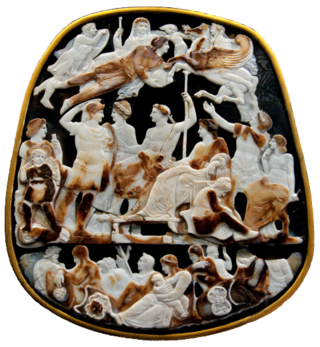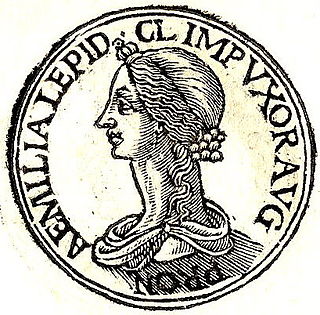Related Research Articles

Julia Agrippina, also referred to as Agrippina the Younger, was Roman empress from AD 49 to 54, the fourth wife and niece of emperor Claudius, and the mother of Nero.

The Julio-Claudian dynasty comprised the first five Roman emperors: Augustus, Tiberius, Caligula, Claudius, and Nero.

Around the start of the Common Era, the family trees of the gens Julia and the gens Claudia became intertwined into the Julio-Claudian family tree as a result of marriages and adoptions.

Antonia the Elder was a niece of the first Roman emperor, Augustus, being the eldest daughter of Octavia the Younger and her second husband, the Triumvir Mark Antony. She married Lucius Domitius Ahenobarbus and became the paternal grandmother of the emperor Nero.

The gens Julia was one of the most prominent patrician families in ancient Rome. Members of the gens attained the highest dignities of the state in the earliest times of the Republic. The first of the family to obtain the consulship was Gaius Julius Iulus in 489 BC. The gens is perhaps best known, however, for Gaius Julius Caesar, the dictator and grand uncle of the emperor Augustus, through whom the name was passed to the so-called Julio-Claudian dynasty of the first century AD. The nomen Julius became very common in imperial times, as the descendants of persons enrolled as citizens under the early emperors began to make their mark in history.
Marcus Junius Silanus was a Roman senator.
Decimus Junius Silanus Torquatus was a Roman senator who lived during the 1st century.

Domitia Lepida was a Roman aristocrat, related to the imperial family. She was mother of Valeria Messalina, wife of the Emperor Claudius. Lepida was a beautiful and influential figure. Like her sister, she was also very wealthy. She had holdings in Calabria and owned the praedia Lepidiana.
Two noblemen, an uncle and nephew, who shared the name Lucius Junius Silanus Torquatus and were descendants of the Roman Emperor Augustus, lived during the 1st century AD.
Junia Calvina was a Roman noblewoman who lived in the 1st century AD.

The gens Junia or Iunia was one of the most celebrated families of ancient Rome. The gens may originally have been patrician, and was already prominent in the last days of the Roman monarchy. Lucius Junius Brutus was the nephew of Lucius Tarquinius Superbus, the seventh and last king of Rome, and on the expulsion of Tarquin in 509 BC, he became one of the first consuls of the Roman Republic.
Junia Tertia, also called Tertulla, was the third daughter of Servilia and her second husband Decimus Junius Silanus, and later the wife of Gaius Cassius Longinus.
Lucius Aemilius Paullus was the son of Paullus Aemilius Lepidus and Cornelia, the elder daughter of Scribonia. He was married to Julia the Younger, the eldest granddaughter of the Emperor Augustus.
Appius Junius Silanus, whom Cassius Dio calls Gaius Appius Silanus, was consul in AD 28, with Publius Silius Nerva as his colleague. He was accused of majestas, or treason, in AD 32 along with a number of senators, but he and Gaius Calvisius Sabinus were saved by one of the informers, Celsus, a tribune of a city cohort.
Lucius Vitellius was a Roman senator who lived in the 1st century. He was the second son of Lucius Vitellius and Sextilia, and younger brother of emperor Aulus Vitellius. Lucius was suffect consul in the nundinium of July-December 48 with Gaius Vipstanus Messalla Gallus as his colleague.

Aemilia Lepida was a noble Roman woman and matron. She was the first great-grandchild of the Emperor Augustus.
Gaius Cassius Longinus was a Roman jurist and politician from the first century AD. A grandnephew of Servius Sulpicius Rufus, he was also a nephew or great-grandson of Gaius Cassius Longinus, one of Caesar's assassins. Longinus was suffect consul of the second half of the year 30 as the colleague of Lucius Naevius Surdinus.
Gaius Julius Alexander Berenicianus was a Cilician Prince and second-born son to King Gaius Julius Alexander and Queen Julia Iotapa of Cetis. His eldest brother was Gaius Julius Agrippa and his younger sister was Julia Iotapa.
Marcus Junius Silanus Torquatus was a Roman senator. He was consul in AD 19, with Lucius Norbanus Balbus as his colleague.